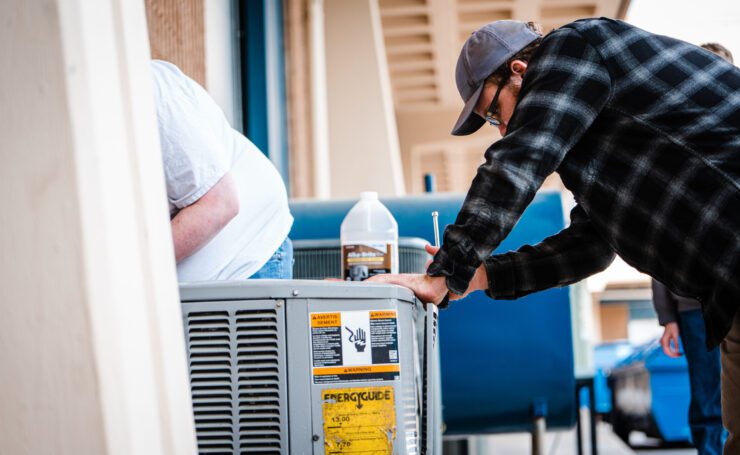HVAC Service Technician Level 1 & 2
Course Description
This is an introductory course, designed to prepare the student for an occupation in the air conditioning and refrigeration trade.
HVAC Service Technician 1 and 2 is a course that is offered over one semester during the day.
HVAC Service Technician 1, and the following HVAC Service Technician 2 are separate classes offered in the evening. These classes can be completed separately over two semesters or taken as a combined class (when offered) within one semester. Level I must be successfully completed before taking Level II.
Through classroom lecture and hands on lab work, the student will learn the safe and practical applications of HVAC repair and service. Training sessions are held in a technical skills lab/classroom. The lab is equipped with the necessary supplies and tools to allow students to run refrigerant piping circuits and do rough in type installations. Students will work on HVAC and refrigeration systems supplied in the lab.
Course Details
Level I includes:
- Introduction to Refrigeration
- HVAC Electricity
- Oil, Gas and Electric Furnaces
- Heat Pump
Level 2 includes:
- Mechanical Cooling
- PLC’s / CFC
- HVAC Controls
- HVAC troubleshooting
This course does not have any prerequisites.
Students should have the ability to work in a team environment, be organized, detail-oriented and be a problem solver. This is a hands-on course so proper attire and safety equipment are required.
Our program technical standards have been developed to help students understand nonacademic standards, skills, and performance requirements expected of a student in order to complete this particular curriculum.
If an accommodation is necessary to participate in the program, it is imperative to identify a reasonable accommodation to those students who qualify under the Americans with Disabilities Act (ADA). Reasonableness is determined by Accessibility Resources and the program on a case-by-case basis utilizing the program technical standards. The accommodation needs to be in place prior to the start of the program, or it may delay your ability to start the program. It is the student’s responsibility to contact Accessibility Resources and request accommodations.
Click to view the technical standards in detail
HVAC Technical StandardsCourse Schedule
HVAC Service Technician Classes
Due to high demand, and limited availability, these classes have moved to a waitlist priority registration. To be added to the waitlist please email James Mitchell at jtmitchell@forsythtech.edu or call at (336) 734-7771.

HVAC service techs are expected to handle the following repairs:
- Repair and installation of air conditioning and refrigeration equipment and systems
- Mechanical system troubleshooting using various tools and test instruments
- Perform routine preventative maintenance of refrigeration and A/C equipment and systems
- Repair and maintenance of both commercial and residential systems
HVAC service techs are employed by air conditioning and refrigeration contractors, repair facilities, hospitals, factories, apartment complexes and other maintenance companies.
Additional Information

How to Register
Interested in this course? You can enroll online by clicking the “Register” link under the course schedule. If you have any issues, please call customer support at 336.734.7023 or fill out the form below.

Student Support
Forsyth Tech has a holistic, wraparound support program to help you. Click to see all the support that is offered.

Contact Us
Need more information? Contact the Program Director James Mitchell by calling 336.734.7771 or email at jtmitchell@forsythtech.edu